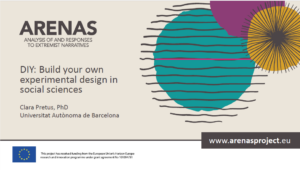By Dr. Clara Pretus, Universitat Autònoma de Barcelona and Rasma Pipike, Diversity Management Expert, Leader WP4, Creative Ideas-Latvia
 During the recent General Assembly of ARENAS, Dr. Clara from the Universitat Autònoma de Barcelona was delighted to deliver a comprehensive workshop titled “DIY: Build Your Own Experimental Design in Social Sciences” as part of Work Package 4. This interactive session aimed to provide participants with hands-on experience in experimental methods, empowering them to integrate these techniques into their own research projects. The workshop was specially designed both for beginners and experienced researchers. The primary objective was to offer an explicit explanation into the practical, scientific, and ethical aspects of experimental design within social sciences.
During the recent General Assembly of ARENAS, Dr. Clara from the Universitat Autònoma de Barcelona was delighted to deliver a comprehensive workshop titled “DIY: Build Your Own Experimental Design in Social Sciences” as part of Work Package 4. This interactive session aimed to provide participants with hands-on experience in experimental methods, empowering them to integrate these techniques into their own research projects. The workshop was specially designed both for beginners and experienced researchers. The primary objective was to offer an explicit explanation into the practical, scientific, and ethical aspects of experimental design within social sciences.
Participants were engaged in exploring fundamental questions such as:
- Why is it important to run experiments in social sciences?
- What types of questions can be effectively addressed through experiments?
- Which experimental designs are most suitable for specific research goals?
Through this exploration, the workshop provided essential components of experimental design, including the development of measurement tools, and the interpretation of results.

Essential topics in the organisation of an experiment.
The workshop was structured around modules that build a comprehensive understanding of experimental design. First of all, setting the stage with the historical context and the significance of experimental methods in social sciences, including key contributions from pioneers like Kurt Lewin, who is considered to be the father of modern social psychology (1930-1940) and Stanley Milgram. Secondly, claiming causality, discussing the importance of establishing causal relationships through controlled experiments and randomised assignments, highlighted by examples from social sciences research. Thirdly, explaining types of Experimental Designs by exploring various experimental designs such as lab experiments, observational studies, field experiments, and their respective strengths and weaknesses in terms of control and ecological validity.
In the design of the experiment, it is important to think about aspects such as measurement tools, and understanding the tools used and required to measure outcomes, such as standardised questionnaires and behavioural measures, while emphasising the importance of reliability, validity, and measurement invariance. It is also important to discuss how to appropriately interpret results focusing on statistical significance, effect size, and the generalizability of findings across different contexts and populations. And last, but not least ethical aspects, address the ethical considerations in experimental research, including principles of beneficence, non-maleficence, autonomy, and fairness. Real-world examples like the Tuskegee Syphilis Study and the Stanford Prison Experiment were used to underscore the importance of ethical conduct, as these examples are outstanding for their harmful outcomes for the participants of the experiment.

Practical application
To illustrate each step of the experimental design process, the workshop referenced the ongoing experiment within the Horizon project ARENAS, titled “How does social media diet affect extremist attitudes?”. This experiment aims to replicate a previous study, which similarly examined the influence of social media consumption on partisan attitudes in the United States. The ARENAS experiment served as a practical case study to demonstrate the application of theoretical concepts in running experiments. Participants were invited to see details of the specifics of this field experiment, which involves manipulating the social media diets of a sample of TikTok users to observe changes in extremist attitudes. The workshop covered the employed approaches, tools and challenges, and foreseen the expected results of the experiments, and what will be accomplished during the experiments organised in the scope of ARENAS. Experiments will be conducted by local teams in close collaboration with Dr. Clara Pretus in Spain, France, Latvia and Cyprus, providing a comprehensive view of how social media influences extremist attitudes in European countries, in line with the aims of ARENAS.
Learning through interactive elements
The workshop emphasised interactivity in the process of learning, encouraging participants to engage in activities that reinforce their understanding of the perception of methodologies used in the design of experiments. For instance, attendees were invited to participate in a game where they had to guess the weight of the Eiffel Tower or the number of windows in the Empire State Building. This interactive approach served to highlight the importance of experimental conditions and measurement accuracy. Additionally, participants had the opportunity to use QR codes to access surveys and other interactive content, fostering a hands-on learning experience.
Build Your Own Experimental Design in Social Sciences workshop was a unique opportunity for researchers to enhance their methodological skills and apply experimental techniques to their studies. By the end of the session, participants were equipped with the knowledge and tools needed to design, conduct, and interpret experiments effectively, ensuring their research is both scientifically solid and ethically sound.
For further information or inquiries, researchers can contact Clara Pretus at clara.pretus@uab.cat or Rasma Pipike at rasma.pipike@gmail.com. Join us to undertake a journey of scientific discovery and methodological excellence in social sciences research.
